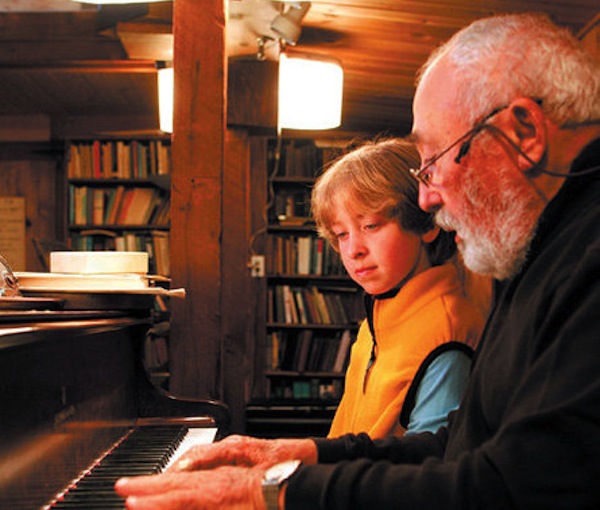Fuse Film Review: The Arlington International Film Festival Kicks off 4th Season with Boffo “Botso”
Botso teaches children the joie de vivre of music and he is remarkably successful.
By Paul Dervis
For a small community film festival, the people behind the Arlington event clearly know how to do it up big. They screen their movies at the 500-seat Regent Theatre, and on opening night the cavernous house was close to full. I have been to many larger festivals where the turnout at the cinematic kickoff was sparse in comparison.
However, there were a few technical glitches last Wednesday, delaying the show by more than a half hour. Still, there was no complaining from the house, a strong indication of the good will and strong support the AIFF has generated in a very short time.
The evening’s main attraction was Botso: The Teacher from Tbilisi, the AIFF Award Winner for Best Documentary. The festival apparently gives out its awards before public screenings begin, but that is no matter, because Botso turned out to be a very worthy recipient
Botso (pronounced BOAT-zo), is the given name of Wachtang Korisheli, a ninety some year-old musician, sculptor, and teacher from the Republic of Georgia who has been living in California since the 1950s. His story is unique and uplifting.
Botso’s father was one of the leading actors in Georgia from the time of the Soviet Revolution. In fact, in the 1930s he was so renowned a postage stamp carried his likeness. But he fell out of favor with Stalin and was arrested and then executed. Overnight, Botso and his mother went from living the high life to a spartan existence. In a scene right out of Doctor Zhivago, their home was given to another family; he and his mother were forced to live in two rooms while the rest of the house was occupied by strangers.
Botso, as a young man, ended up working with the Russian Army during the German March into Russia in World War II. But after the war he escaped and eventually landed in the United States, losing contact with his mother, the only family he knew. After a short period of struggle, Botso was introduced to a silent screen actress who took him under her wing, letting him live in her beach house. This is where his began his creative life and established his future.
Botso teaches children the joie de vivre of music and he is remarkably successful. The audience hears from these students, young and old: they talk about the first innocent joys of learning and then reflect on the growth of an intense, emotional focus on their art. One senses the man is instructing others not only about music, but about life.
The audience is also invited to experience Botso’s search for truth through his art. The pigments for his sculptures are not store bought; they are made out of the colored stones he gathers from his environment and crushes. He has handcrafted all the handles and doorknobs in his home. This kind of resilient and imaginative self-reliance is what he teaches his students. And they learn well.
The filmmaker, Tom Walters, has interviewed past and present disciples of Botso, ranging from internationally acclaimed symphony conductors to auto mechanics. They all share more than a deep love for him—he seems to have instilled in them a resolute sense of being.
The film has three separate arcs. It starts off with images of Botso’s present students, following them during a five-year period. Their growth, not only as musicians but as thinkers, is startling. These powerful scenes are interspersed with comments from past students now working with orchestras around the world. The second arc is Botso’s history, from the tribulations of his childhood to success in California. The latter leads to Walters’s heartwarming climax, a celebratory reunion concert made up of past and present students. It is inspiring to watch the Munich Symphony conductor work with a ten-year-old pianist.
The opening film for Botso was an 18-minute short entitled The Man Who Fed His Shadow, from Greek director Mario Garefo. This film won the AIFF Award for Best Narrative Short and one wonders how that was possible. It was poorly shot: the movie is so darkly lit, in fact, that it was difficult to read the subtitles and make heads-or-tails of the inordinately convoluted story line. How it was paired with the enchanting Botso is a mystery.
All in all, even with its technical flaws and an unfathomable curtain riser, Botso made the festival’s opening night an impressive success.
Paul Dervis has been teaching drama in Canada at Algonquin College as well as the theatre conservatory Ottawa School of Speech & Drama for the past 15 years. Previously he ran theatre companies in Boston, New York, and Montreal. He has directed over 150 stage productions, receiving two dozen awards for his work. Paul has also directed six films, the most recent being 2011’s The Righteous Tithe.


